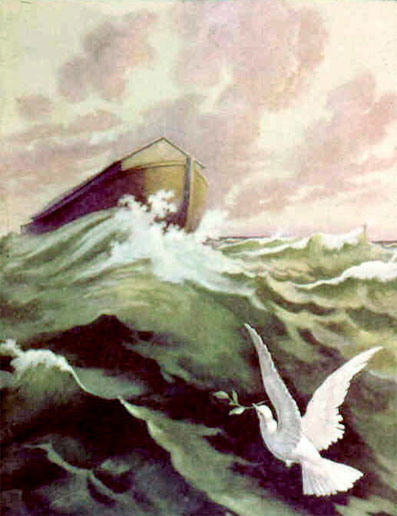Jul
6
2009

If we don’t get Genesis right, we’ll get much of the Bible wrong. In Through New Eyes (PDF), James Jordan identifies a three-level “cosmos” in the Creation, which is reflected on the earth. There is the Garden Sanctuary, the Land of Eden, and the Outlying Lands, or Garden, Land and World.
This is reflected, not only in the ark of Noah, but also in the Tabernacle. The image is dual, one in heaven and one on earth:
Continue reading
Comments Off | tags: Against Hyperpreterism, Altar, Babel, oikoumene, Paul, Tabernacle | posted in Against Hyperpreterism, Biblical Theology, The Last Days
Jun
27
2009
or Silencing the Higher Critics

Yet more on literary analysis of the Bible as a ‘terrible marvel‘; a review of two books. As Warren Gage has commented, we are on the verge of a tremendously creative time in Biblical theology. But this to me seems also to be an element of scholarship returning home, older and wiser, from a wilderness of unbelief.
Genesis: The Story We Haven’t Heard
by Paul Borgman. Downers Grove, IL: Intervarsity Press, 2001. 252 pages.
The Literary Structure of the Old Testament: A Commentary on Genesis-Malachi
by David A. Dorsey. Grand Rapids, MI: Baker Books, 1999. 330 pages.
Reviewed by Timothy Paul Erdel, Ph.D., Archivist and Assistant Professor of Religion and Philosophy, Bethel College, Mishawaka, IN.
“I have been fascinated by the primal power of Old Testament stories for as long as I can remember. From my perspective, there is no clearer window on human character, no greater storehouse of hard and holy truths. Yet some tales are deeply disturbing. Phyllis Trible calls them ‘texts of terror.’ Even the most familiar passages may seem strangely distant. So I relish each time a preacher or teacher sheds new light on these ancient Hebrew narratives.
Continue reading
Comments Off | tags: Abraham, Babel, C. S. Lewis, Chiasm, Compromise, David A. Dorsey, Higher Criticism, Isaiah, Jeremiah, Literary Structure, Warren Gage | posted in Biblical Theology, Quotes
May
25
2009

Ascension Sunday
Andrew Katay posted a quote this week stating that when the church fails to emphasise the Ascension, a commitment to church programs instead of to Christ fills the vacuum. This should come as no surprise.
Continue reading
Comments Off | tags: Ascension, Babel, Babylon, Herod, Moses, Passover, Revelation | posted in Biblical Theology, The Last Days, Totus Christus
Apr
10
2009
or An answer for those who think modern day Israel has any special place in Bible prophecy.
After the scattering at Babel, the Lord tore the world in two by calling Abram. With the end of this large Division, signified by circumcision, there was no more distinction between the priest nation and the Gentiles. James Jordan writes:
Continue reading
Comments Off | tags: Abraham, Babel, Bible history, Dispensationalism, James Jordan | posted in Biblical Theology, The Last Days, The Restoration Era, Totus Christus
Apr
8
2009

James Jordan points out that when the Lord confused the languages of the Babel builders, the Hebrew term is ‘lip’, and it carries the connotation of scattering their religious profession.
Continue reading
Comments Off | tags: Babel, James Jordan, Power of the Gospel, Tongues | posted in Biblical Theology, Ethics
Apr
8
2009
“The failure to understand the Babelic context of Israel’s history results in a failure to understand the purpose of tongues in the New Testament, and a failure to understand the historical transition that took place between A.D. 30 and 70. God judged Babel because if the people were united, nothing would be withheld from them (Gen. 11). Jesus prays that His people would be united, so that nothing will be withheld from us (John 17). It was necessary for Jewish and Gentile believers to overcome the Old Covenant bipolarity and be united, before the Gospel could really go forth in full power. After A.D. 70, with Jew and Gentile united in one Church, nothing can be withheld from us, unless we choose by our sin to be disunited. After A.D. 70, there is no longer any God-instituted historical disunity in operation.”
- James B. Jordan, The future of Israel re-examined
http://www.bullartistry.com.au/lastdays.html (articles 13-15)
Comments Off | tags: Babel, James Jordan, Tongues | posted in Biblical Theology, The Last Days
Apr
8
2009
“…Here we see the third Babylon in all its horror. Both city (Nimrod: Herod + Pilate-Caesar) and tower (priests and Jews) join in putting Jesus to death. Together, they intend that their city and tower will endure, no matter what the God of Heaven says or does. Judgment comes, however. As God came  down on the first two Babylons, the Spirit comes down at Pentecost. Immediately there is a confusion of tongues. Jews of every nation hear the gospel in every language except Hebrew-Aramaic. This time, however, instead of a scattering of lips (religions), there is a unification of lips around the praise of the Father of Jesus Christ. As we shall see below, however, there is another sense in which there is a scattering of different “lips.” The “gift of tongues” continues on and off throughout the Apostolic Age until Jerusalem (the whole circumcision) is destroyed in the destruction of Mystery Babylon in ad 70. The Jews are brought into consternation (1 Corinthians 14:21–22; compare Acts 18:7). Continue reading
down on the first two Babylons, the Spirit comes down at Pentecost. Immediately there is a confusion of tongues. Jews of every nation hear the gospel in every language except Hebrew-Aramaic. This time, however, instead of a scattering of lips (religions), there is a unification of lips around the praise of the Father of Jesus Christ. As we shall see below, however, there is another sense in which there is a scattering of different “lips.” The “gift of tongues” continues on and off throughout the Apostolic Age until Jerusalem (the whole circumcision) is destroyed in the destruction of Mystery Babylon in ad 70. The Jews are brought into consternation (1 Corinthians 14:21–22; compare Acts 18:7). Continue reading
Comments Off | tags: Babel, baby, hero, Pilate, Tongues | posted in Biblical Theology, The Last Days






























